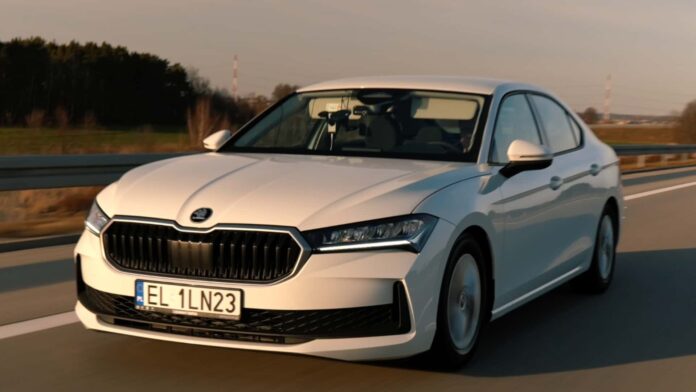The diesel engine is gradually fading. Even in Europe, the last stronghold of the oil-burner, demand has plummeted in recent years. At its peak, diesel accounted for more than 50 percent of new car sales in the early 2010s, obviously before the Volkswagen Group’s notorious scandal. Through August this year, its market share among new cars has shrunk to just 8.3 percent, according to the European Automobile Manufacturers’ Association (ACEA).
One reason diesel is dying a slow death is that automakers are systematically dropping this type of engine in favor of hybrids to meet increasingly strict emissions regulations. Still, Skoda is holding on to its beloved TDI in several models, including the Superb. The flagship sedan (it’s technically a liftback) has even set a Guinness World Record, further proving that diesel remains the undisputed efficiency champion for long-distance travel.
Miko Marczyk, the 2025 European Rally Championship winner, drove the Czech brand’s range-topper for 1,759 miles (2,831 kilometers) without refueling. The car was a bone-stock Superb, save for low rolling-resistance tires and suspension-lowering springs borrowed from the Sportline version. Ride height was reduced by 0.6 inches (15 millimeters) for improved aerodynamics, but otherwise the car was unmodified.
To maximize his chances of setting a record, Marczyk filled the 17.4-gallon (66-liter) tank of his personal car to the brim. As you’d expect, the 29-year-old Polish driver maintained a light touch on the throttle. His route took him from Łódź in Poland through Germany and Paris, then back via the Netherlands, Belgium, and Germany, covering the distance at an average speed of about 50 mph (80 km/h). The ERC champion showed remarkable restraint, considering he’s used to pushing his Fabia RS Rally2 to the limit at work.
Photo by: Skoda
The Superb averaged just 2.61 liters per 100 kilometers (90.1 mpg), far better than its official 4.8-liter (49 mpg) rating. While driving through France, a tailwind helped achieve an impressive 2.2 liters per 100 kilometers (106.9 mpg) over a 124-mile (200-kilometer) stretch. The car’s small 16-inch wheels and relatively low weight, 3,505 pounds (1,590 kilograms), also worked in its favor.
This particular Superb was a front-wheel-drive version with a seven-speed dual-clutch automatic gearbox, driven entirely in Eco mode. Needless to say, Marczyk didn’t explore the full potential of its 2.0-liter TDI engine, rated at 148 horsepower and 266 pound-feet (360 newton-meters) of torque. To optimize the route, a support vehicle drove a couple of miles ahead, providing updates that helped him anticipate traffic, minimize braking, and accelerate smoothly.
Despite setting a record, the rally champion wants to push his hypermiling feat even further. His next target is to cover 3,000 kilometers (1,864 miles) on a single tank. Marczyk believes it’s achievable, noting that his previous run included long uphill stretches and cold night driving in Germany, where temperatures dropped to 1°C (33.8°F). He also believes that using premium diesel could enhance his chances of reaching that milestone.
Even so, Skoda’s parent company, the Volkswagen Group, is steadily phasing out diesels. They’ve already disappeared from smaller cars like the Polo and Fabia, remaining only in the Golf, Octavia, and larger models. If the European Union upholds its planned 2035 ban on new combustion-engine cars, ICE will vanish entirely from the continent’s new-car market. Realistically, diesel may not even survive until the middle of the next decade, at least not in passenger cars.
